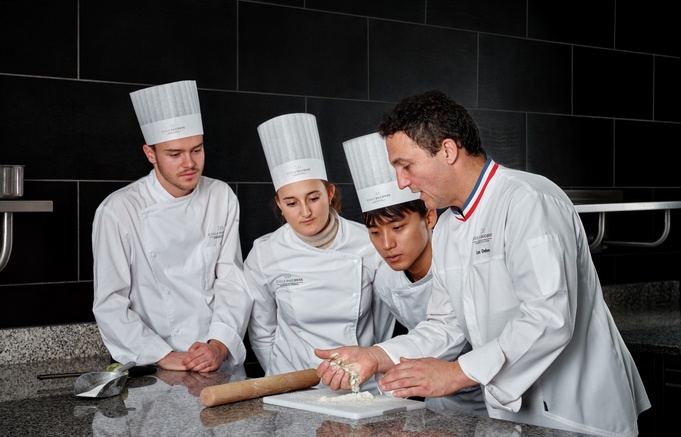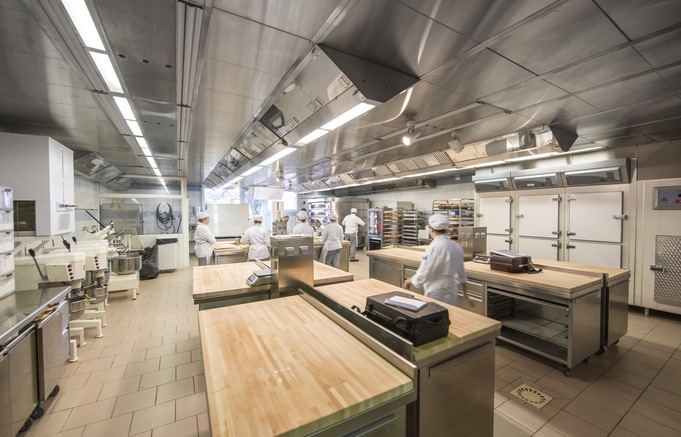How to become a restaurant manager

Whether you’re a high school graduate looking to learn more about jobs in the hospitality industry or someone hoping to change career, considering a role as a manager at a restaurant could be for you. If you’re passionate about making an impact in the food and beverage industry, learning more about how to become a restaurant manager could give you insights on getting started in this field.
To support you, we examine how to be a restaurant manager in this guide. We’ll also review what the role entails and share the steps you need to take to enter restaurant management.
Understanding the role of a restaurant manager
Before applying for a job in restaurant operations or applying to study culinary arts, understanding the role of a restaurant manager can help you determine whether this is right for you. It’s normal to have questions about what a manager in hospitality does. We answer some of our most frequently asked questions about restaurant manager responsibilities below to give you deeper insight into the role.
What does a restaurant manager do?
Restaurant managers are responsible for the day-to-day operations of diners, cafés, bistros, fine dining establishments and brasseries. They manage teams of chefs, waiting staff and cleaners. In addition to these responsibilities, restaurant managers guarantee exceptional customer service and fulfill marketing and financial obligations to ensure the restaurant attracts and retains customers while making a profit.
What are the key responsibilities of a restaurant manager?
In a restaurant manager role, responsibilities you can expect to fulfill include:
- Staying up-to-date with restaurant industry trends
- Reviewing and implementing changes based on food service industry best practices
- Completing inventory checks
- Placing orders for food and beverage supplies
- Liaising with suppliers
- Hiring new members of staff
- Conducting staff training
- Supervising staff
- Creating staff rotas
- Ensuring staff are paid on time
- Resolving conflict among teams
- Ensuring all dishes meet the standards of the restaurant
- Supporting the design of new menus
- Welcoming customers
- Managing bookings
- Overseeing customer service
- Dealing with customer complaints
- Marketing
- Financial management
What skills and qualities are essential for a successful restaurant manager?

Hispanolistic/E+ via getty images
Restaurant managers must have a range of skills and qualities. One of the most important of these is leadership. As managers oversee various teams, their ability to lead significantly impacts the restaurant's success. Other skills and qualities essential for a restaurant manager include:
- Communication
- Empathy
- Negotiation
- Customer service
- Problem solving
- Decision making
- Conflict resolution
Is restaurant management the right career choice for you?
If you’re wondering whether becoming a restaurant manager is the right career choice, it can be helpful to think about your ambitions. If you aspire to work in restaurants and would eventually like to oversee restaurant operations, it could be the role for you. If you’re passionate about working with others, desire a career in hospitality and have previous experience working in restaurants, being a restaurant manager could be highly satisfying.
Building a strong foundation
When thinking about how to become a restaurant manager, one of the most important things you can do is build a strong foundation. This involves gathering knowledge about:
- industry trends and awareness of how these may affect restaurant operations
- different types of restaurants and their managerial requirements
- customer service in restaurant management
- best practices that guide restaurant operations
How can I build a strong foundation in restaurant management?
Building a strong foundation in restaurant management often starts with a culinary arts degree. In addition to vital skills for restaurant managers, building a strong foundation includes learning about competitors and target audiences. Mastering how to develop relationships with stakeholders and industry professionals is also recommended.
What are the different types of restaurants and their operations?
There are many different types of restaurants, including cafés, fast food restaurants, casual dining restaurants, fine dining establishments, pubs, gastropubs, bistros, diners, pizzerias, tapas bars, steakhouses and brasseries.
Each of the different types of restaurants carries out standard operations, such as preparing ingredients for dishes, cooking, serving customers and purchasing ingredients from vendors and suppliers. However, there are some differences in operations.
For example, cafés generally offer a relaxed atmosphere and a casual menu. Fine dining restaurants are more up-market and provide a sophisticated atmosphere and refined cooking for a unique dining experience.
Acquiring the essential skills and knowledge

To become a restaurant manager, you need to start by learning the essential skills and knowledge that can support you in culinary careers. These can be learned through practical experience working in restaurants or by studying at a culinary school.
Developing leadership skills for restaurant management
As a restaurant manager, you’ll be responsible for various teams of people. To prepare yourself for this, it’s important you spend time developing your leadership skills.
If you’re a recent high school graduate, working in restaurants can offer insight into these skills. Likewise, completing internships can also help you learn more about leadership in restaurant management and skills such as emotional intelligence, decision making, delegation and communication skills.
Gaining expertise in restaurant operations and customer service
Just as leadership skills can be developed through practical training, so can expertise in restaurant operations and excellent customer service skill. Aspiring restaurant managers often start at an entry-level job and, over time, work up to a managerial position.
Although you may wish to jump straight into a managerial role, working in various types of restaurants can offer an understanding of how operations vary depending on the establishment. Working in customer service can help you learn how to develop skills, including problem solving, active listening, communication, adaptability and conflict resolution.
Educational and career pathways for restaurant managers
When it comes to education for restaurant management, there are various pathways you can take. For example, here at École Ducasse, we have a range of bachelor's programs, including our Bachelor in Culinary Arts.
Master the skills to make an impact in restaurant management.
Combine priceless practical experience with restaurant business insights and learn from industry-leading professionals when you study at École Ducasse.
Launch your career as a restaurant manager with our Bachelor of Culinary Arts.
If you’ve already graduated high school and completed higher education but are now looking to change direction, other education pathways open to you include diplomas for career switchers.
Invest in your delicious future.
Want to transform your career and gain the expertise to be a restaurant manager? Our six-month diploma immerses you in culinary arts, leadership and business management.
Study for a culinary arts diploma guided by the vision of Chef Alain Ducasse.
What qualifications do you need to be a restaurant manager
Qualifications needed to be a restaurant manager vary and often depend on the practical industry experience you already have. Although not all restaurants will ask for qualifications, some will look for high school diplomas and undergraduate degrees that specialize in the hospitality and culinary industry.
Practical experience and training opportunities
While qualifications are important, practical experience and training for restaurant managers can be gained through working in the hospitality industry. If you're asking yourself is culinary school worth it, another route to follow could be starting at entry-level positions and obtaining on-the-job training to become a manager.
Starting at entry-level positions in restaurants
Starting at an entry-level position and working up to restaurant manager has become increasingly popular thanks to advances in restaurant management. This can be the basis of alternative careers for chefs and benefits such as:
- Gaining practical experience
- Understanding customer needs
- Learning how to cope with customer and industry demands
- Working with other teams in the restaurant
- Understanding how other teams operate
- Insight into the day-to-day operations of restaurants
After a number of years, having started at an entry-level position could see you promoted to a managerial role. Likewise, starting at entry-level positions in one restaurant will enable you to apply for other roles in different restaurants with the skills you have developed.
The importance of on-the-job training and mentorship

On-the-job training and mentorship are essential for your restaurant industry career development. Learning how to be a restaurant manager from those already doing it can provide insights into what would be expected of you when the time comes for you to become a manager at a restaurant.
With an understanding of key responsibilities such as marketing strategies for restaurant managers and financial management for restaurant managers, you’ll be able to apply your knowledge and support the restaurant in generating a profit with confidence.
Nurturing professional growth and advancement
Throughout your career as a restaurant manager, you’ll have many opportunities to continue your learning through professional development. The hospitality industry is continuously changing and expanding and you’ll have a responsibility to ensure you refine your skills, grow and advance.
Continuing education and professional certifications
After completing a degree and starting practical work experience, continuing your education with professional certifications can be beneficial in your quest to become a restaurant manager. For example, there are certifications that focus on leadership, change management, conflict management and strategic planning. Each of these certifications can offer you a fresh perspective and support you in learning how to navigate challenges you may face as a manager.
Networking and building industry connections
In addition to enhancing your qualifications and expertise on your journey to becoming a restaurant manager, developing industry connections is also important. By attending networking events and visiting conferences and trade shows, you’ll have the opportunity to meet other restaurant professionals and find professional advice and guidance. Building industry connections can also widen your network, which could help your career.
Conclusion
Learning how to become a restaurant manager is a great first step in achieving your culinary career goals. By understanding how to be a restaurant manager, the responsibilities and skills you’ll need and the training available, you have every chance of succeeding.
Studying culinary arts can be an excellent first step in your career as a restaurant manager, and a degree at a French culinary school is a great place to start. To learn more about what can you do with a culinary degree and how a degree can benefit you, contact us today.
Photo credits
Main image: Westend61/ Westend61 via getty images


